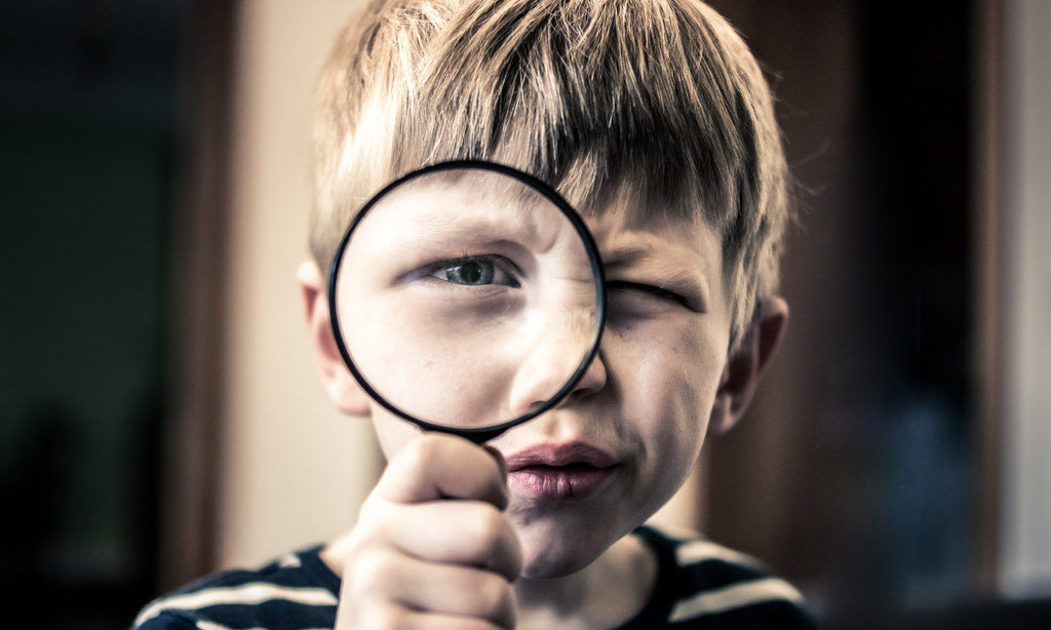
By Dr. Sara Teichman
Many a mother feels driven to distraction by her young child’s curiosity. Whether her child is into everything, tries to take things apart, or perpetually asks “why” – well, it’s enough to drive a mother crazy.
Though there’s no denying that the curious child is a handful, curiosity is a very positive characteristic. In fact, curiosity is critical for our child to learn and grow throughout his lifetime, and is well worth developing in our children and ourselves. Curiosity is the gap between what we know and what we want to know – and in a young child, that gap is quite wide. Exploring, climbing, questioning and experimenting are all healthy and age appropriate, and we want to take the time and energy to respond to our child’s curiosity.
The curious child investigates, discovers, questions, wonders, and by doing so, learns. While we may feel that we will scream if he asks us “why” one more time, those questions are a good thing. They are a sign of an active mind that is in overdrive. Curiosity leads to discovery and learning. So, for example, by switching the light off and on, the toddler learns cause and effect. By pouring water into differently shaped containers, the child learns about smaller and bigger. By finding out ”why,” he gains some understanding of his world.
Children are born curious; they touch, taste, watch and listen to everything in their surroundings. Each experience is novel and fresh, and as parents, we want to reward our children’s curiosity by giving it the attention it deserves. We want to treat their curiosity with respect, even though that requires more time and energy from us. As responsible parents, we want to go beyond feeding and clothing our children and develop those qualities that will serve our children well throughout their lifetime.
There are many ways to stimulate our children’s curiosity. We can encourage questions and ask some ourselves, so that the everyday becomes a source of interest and fascination. We can introduce our child to a variety of interests: games, puzzles, books, music, crafts and art. We can expose our child to our world: the market, the bank, and post office. We can explore different places, like parks, trains, gardens, aquariums and zoos, and broaden our child’s horizons by having him read books about different people, times and countries. By awakening our child’s natural curiosity and training him to take an interest in the world around him, we are helping him live a full life because our potential — emotional, social and cognitive — is maximized though the quality and quantity of our experiences.
Curiosity is not only for the young; it is an advantage for the adult as well. Curious people are interesting people. They are not self-absorbed and thinking about themselves all the time. Rather, they are interested in others and view the world through a wide-angled lens. Because their inquiring minds are always working, they are less dependent on being entertained — by others or by video games, shows, and other electronics. Curious people are active and alive, not passive and dull.
But far too many children lose their sense of curiosity. We treat curiosity as though it is an annoyance, rather than the precious commodity it is. And we may inadvertently crush it by our attitudes and fears, to the detriment of our children.
Our disapproval, even of the most casual sort, teaches our children to ignore their natural tendency to investigate and learn. Our don’t touch, don’t ask, don’t climb, don’t do that — all those “don’ts” spell disapproval. Our children desperately seek our approval and love, and to maintain it, they learn to shut off an aspect of their curiosity. And while certainly there are times we cannot allow them to touch (a hot stove, for instance), and things they absolutely cannot do (jump off the roof into a snow bank), we do want to be mindful and avoid the constant stream of “no’s.”
So, for example, we may forgo expensive, fragile items on the coffee table to forestall the inevitable “Don’t touch!” and we may avoid have reading material around the house that we don’t want our children to read. But instead of having to stifle their curiosity and desire to read, we can stoke it by working on getting them books that we are okay with them reading.
Curiosity is a gift. A curious person is not bored – he finds meaning, knowledge, and adventure in his everyday life. By supporting our child’s curiosity right from the beginning, we gift him with a quality that will bring meaning and satisfaction to himself and those around him.
Dr. Sara Teichman maintains a private practice in Los Angeles, California, where she specializes in individual, parenting, and marital concerns. In addition, she is the Clinical Director at ETTA/OHEL. She is the author of a bi-weekly parenting column, Child in Mind – Ask Dr. T. in Binah Magazine. Dr. Teichman also gives lectures on parenting and a variety of clinical issues in person and by teleconference all around the United States. To contact Dr. Teichman, email sara.teichman@etta.org.
 Previous
Previous

